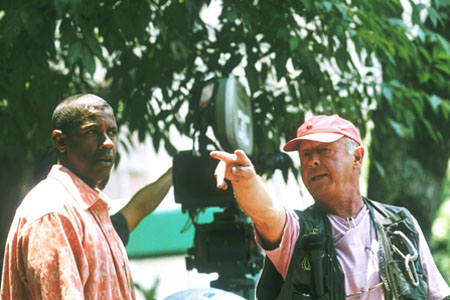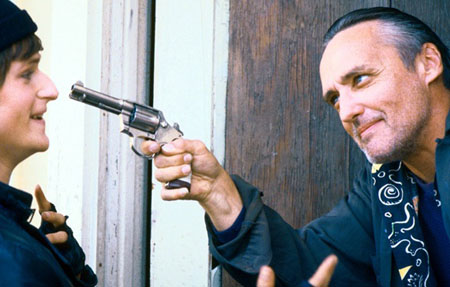Heavens, has it been nearly a week again, setting aside yesterday’s books roundup, since the last news update? Nothing like a long holiday to throw your rhythm off. At any rate, the biggest thing to happen since last week has to be Tony Scott: A Moving Target, an “exquisite corpse-style critical project on the films of Tony Scott featuring twenty critics and twenty scene analyses” initiated by Notebook editor Daniel Kasman and contributor Gina Telaroli. Delve into the oeuvre of the late “unquestioned elder-god of the vulgar auteurists,” as Christopher Small dubs him.
Not entirely unrelated is the new third issue of Screen Machine, “Redemption.” Editor Brad Nguyen: “Andrew Sarris and Psycho. Cahiers du cinema and the films of Jerry Lewis. More recently, Nicole Brenez and Abel Ferrara. The history of film criticism is littered with such moments when a critic ‘redeems’ a film or a director, unrecognised or disavowed by the majority of the arbiters of ‘good taste.'” So in this issue, for example: “Robbie Fordyce redeems Richard Kelly’s Southland Tales for what he describes as its deployment of cinematic ‘heterotopias’; James R. Douglas marvels at the more abstract level at which The Dark Knight Rises operates as an example of Eisensteinian montage; Anders Furze writes on the compellingly inhuman quality of Ridley Scott’s Prometheus; and I describe how the mash-up of genres in The Twilight Saga: Breaking Dawn—Part 1 produces a progressive idea of love.”
Catherine Grant alerts us to two new second issues. NECSUS is “the brilliant journal of NECS, the European Network for Cinema and Media Studies,” while the new Frames “contains six fine articles, on a variety of topics, produced in collaboration with the British Association of Film, Television and Screen Studies (BAFTSS).”
Film International previews its 60th issue and Offscreen dedicates its latest to the late professor of Film Studies, Louis Goyette.
More reading. David Bordwell explores the work and ideas of Tim Hunter, who’s directed features (River’s Edge [1986] and The Saint of Fort Washington [1993] as well as episodes of Mad Men, Breaking Bad, and Twin Peaks. He’s also “a classic Sarrisian cinephile.”
Frieze senior editor Dan Fox considers the work of Nigel Kneale, “best known as the author of the Quatermass television plays and films (which, when originally screened in the UK in 1953 were watched by a third of all UK TV owners). Yet with his chilling 1954 adaptation for the BBC of George Orwell’s Nineteen-Eighty Four (1948) and screenplays such as The Road (1963), The Year of the Sex Olympics (1968), The Stone Tape (1972) and Murrain (1975), Kneale evolved a uniquely haunted form of science-fiction, one that fused the white heat of technology and broadcasting with rural occultism, and drove parapsychology headlong into Cold War fear.”
The 1941 W.C. Fields film Never Give a Sucker an Even Break “is self-reflexive, intercontextual, cross-referential, and at times confounding—in short, it’s a postmodernist film made nearly two decades before French intellectuals coined the term,” argues Jim Knipfel. Also in the Chiseler, Imogen Smith: “Jean Gillie was known as a comedienne in Britain, and Decoy [1946] was her only brush with noir. The director, Jack Bernhard, was her husband, and it is perhaps not surprising that their marriage was short-lived. She returned to England, where she tragically died of pneumonia in 1949, aged 33. Perhaps she caught a chill playing one of the coldest women on film.”
David Davidson weighs the influence of Tarkovsky on Igor Drljaca‘s debut feature, Krivina.
At One+One Filmmakers Journal, Clara Pais and Daniel Fawcett write an ode to Marguerite Duras’s India Song (1975).
“With 35mm Film Dead, Will Classic Movies Ever Look the Same Again?” asks Daniel Eagan at the Atlantic.
Interviews. Forrest Muelrath emails Michael Robinson for BOMB, and Michael McWay talks with Frank V. Ross about Tiger Tail in Blue for Hammer to Nail.
Festivals. From May 15 through 26 of next year, India will be the third “guest country” at Cannes, following Egypt in 2011 and Brazil this year.
The South Caucasus will be the focus of the Open Doors section of next year’s Locarno Film Festival, running August 7 through 17.
Awards. At this past weekend’s Golden Horse Awards, Johnnie To won best director for Life Without Principle, which also scored a best actor award for Lau Ching-wan. Best feature, though, went to Gao Qunshu’s Beijing Blues. Dean Napolitano and Aries Poon report for the Wall Street Journal and Nathaniel R has a clip from the ceremony.
“Greek-Turkish coproduction Tepenin Ardi (Beyond the Hill) has won for best feature film at the sixth annual Asia-Pacific Screen Awards (APSAs) held in Brisbane this weekend,” reports Paul Chai for Variety.
New York. Slate‘s June Thomas tours Katharine Hepburn: Dressed for Stage and Screen, an exhibition on view at the New York Public Library for the Performing Arts through January 12, and finds that “as with an exhibition that occupied the same space earlier this year, Star Quality: The World of Noël Coward, it’s the ordinary items that seem most fascinating.”
Lisa Duva’s Cat Scratch Fever (2011) screens Sunday at the Museum of the Moving Image. It’s a film that “proposes a ‘many worlds’ interpretation of the Schrödinger’s cat paradox, using the laptop as a portal,” explains Amy Taubin at Artforum. “If you are not familiar with the 1935 absurdist critique of a central theory of Quantum physics, you will now be able to spend many pleasurable hours Googling it and following links that, among other things, will allow you to understand Stanley Kubrick’s The Shining (1980) and Eyes Wide Shut (1999) as never before. Also Shane Carruth’s Primer (2004) and Jacques Rivette‘s Celine and Julie Go Boating (1974), two of Duva’s direct inspirations. Cat Scratch Fever is Primer with, about, and for girls, er… young women. Its depiction of female friendship puts a new spin on its addiction/time-travel/coming-of-age narrative. Lisa (Starsha Gill) and Ashley (Kara Elverson) love each other as deeply as Thelma and Louise did, making Duva’s movie the anti-Girls, to invoke the HBO series which is about how cool it is to be in love with your own imperfections.”
“BAMcinématek’s 22-film retrospective barely scratches the surface of [Max] Von Sydow‘s almost 150 credited titles, but the sampling does give you a sense of the multifarious Max’s intriguing eclecticism,” writes Time Out New York‘s Keith Uhlich. Through December 14.
San Francisco. From today through December 9, “Another Hole in the Head spreads its horror, sci-fi, and just plain weird wealth around to various venues,” and Cheryl Eddy‘s got an overview in the Bay Guardian.
Berlin. Campingplatzkino is showcasing work by Klaus Lemke from today through December 19.
DVD/Blu-ray. Jean-Luc Godard‘s Weekend (1967) “is, above all else, an angry film,” writes Calum Marsh for Slant, “perhaps the most vitriolic condemnation of contemporary culture ever penned, an emphatic and resounding fuck-you to late capitalism, consumerism, and the widespread complacency they so readily inspire.”
“Released a few weeks after Jimmy Carter’s inauguration, Robert Aldrich’s 1977 political thriller Twilight’s Last Gleaming found few takers for its angry denunciation of America’s cold war policies,” writes Dave Kehr in the New York Times. “Vietnam was over, Watergate was behind us, and Richard M. Nixon was enjoying his pardon and working on his memoirs. The film-going public was not interested in Aldrich’s acerbic agitprop, even if it was embedded within a tight, effective thriller about a disillusioned general (Burt Lancaster) who takes over a missile silo in Montana, placing nine nuclear warheads under his control…. Aldrich would make three more films after Twilight, all of them with their pleasures but none with quite the same degree of personal commitment. Though he could not have known it at the time, the film was to be his last gleaming as well, the final great work of a great American filmmaker.”
Paul Feig (Bridesmaids) picks his top ten Criterions.
In the works. “Hoping to succeed where Will Smith, Terrence Howard, Cameron Crowe, and F. Gary Gray have all failed before them, Lenny Kravitz is now officially attached to play Motown legend Marvin Gaye in director Julien Temple’s Midnight Love, which will be at least the third or fourth attempt to tell the singer’s story on film in recent years.” Sean O’Neal reports at the AV Club.
“Two of Sundance 2012’s breakout stars are preparing for another adventure, as the Safety Not Guaranteed team of Colin Trevorrow and Derek Connolly have been hired to rewrite Disney’s Flight of the Navigator remake,” reports Variety‘s Jeff Sneider.
Obits. “Jose Luis Borau, one of the founding fathers of modern Spanish cinema, died Friday at the age of 83,” reports Variety‘s John Hopewell. “Debuting with 1964’s Brandy, a loving Western pastiche, then helming 1965’s Double-Edged Crime, a brooding psychological thriller, Borau directed his first major film in 1967, B Must Die, a twisting thriller whose political sophistication passed most critics by. Recognition came with 1975’s Furtivos, an energetically shot and tautly written rural fable of a downtrodden son who rebels against a despotic mother after she kills his girlfriend, a reformatory escapee.” More from Deadline.
“Larry Hagman, who died Friday of cancer at 81, wasn’t just a gifted actor,” writes New York‘s Matt Zoller Seitz. “He was a great star who pulled off one of the most unlikely reinventions in American TV. Whether playing the befuddled Major Anthony ‘Tony’ Nelson on I Dream of Jeannie or raising hell as J.R. Ewing on Dallas, there was always an alertness and joy in his acting, but the breadth of Hagman’s talent becomes undeniable when you put those key roles next to each other.” More from Ronald Bergan (Guardian), Phil Nugent, James Poniewozik (Time), and Todd VanDerWerff (AV Club). And at Dangerous Minds, Marc Campbell posts of clip of Hagman recalling “the time he drove Keith Moon to rehab after the drummer over-indulged in Black Beauties (amphetamine).”
“Dinah Sheridan, who appeared in classic British films including The Railway Children and Genevieve, has died at the age of 92,” reports the BBC. The Guardian‘s Andrew Pulver posts a few clips.
“Martin Richards, the Tony Award-winning producer behind such Broadway hits as On the Twentieth Century, Sweeney Todd, and The Will Rogers Follies, as well as an Academy Award-winning producer of the film Chicago, has died after battling cancer,” reports Mark Kennedy for the AP. “He was 80.”
Mel Shaw, “a visual development artist, designer and writer who contributed to Disney animated features from Bambi through The Lion King,” has died, aged 97, reports Variety.
More browsing? See Mike Everleth, the Film Doctor, Steve Greene (Criticwire), and Bruce Reid (Parallax View).
For news and tips throughout the day every day, follow @KeyframeDaily on Twitter and/or the RSS feed. Get Keyframe Daily in your inbox by signing in at fandor.com/daily.








